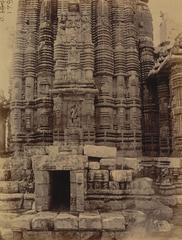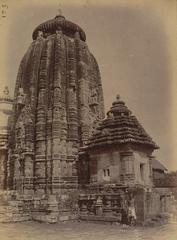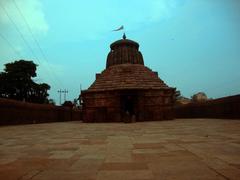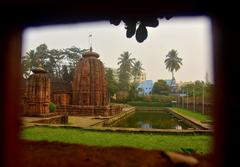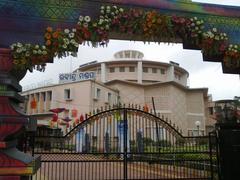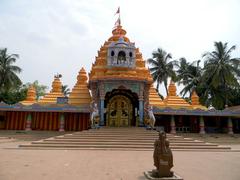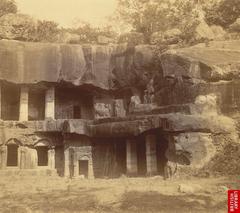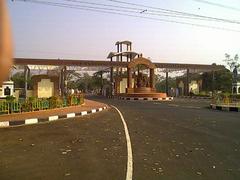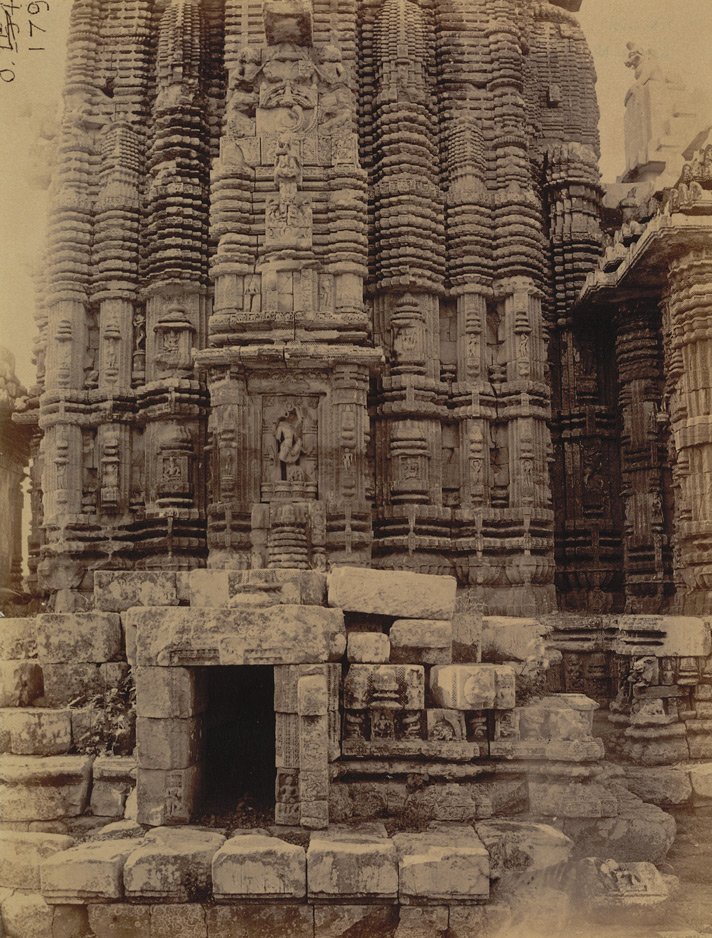
Ananta Vasudeva Temple Visiting Hours, Tickets, and Bhubaneswar Historical Sites Guide
Date: 15/06/2025
Introduction
The Ananta Vasudeva Temple, located in the heart of Bhubaneswar’s Old Town, is a monumental 13th-century Vaishnavite shrine that distinguishes itself in a city celebrated for its Shaivite heritage. Dedicated to Lord Krishna (Vasudeva), Lord Balarama (Ananta), and Goddess Subhadra, this temple stands as a symbol of Odisha’s religious diversity, artistic grandeur, and historical continuity. Commissioned in 1278 CE by Queen Chandrika Devi of the Eastern Ganga dynasty, the temple reflects the syncretic spiritual traditions of the region and serves as a pivotal center for ritual, festival, and community life.
This comprehensive guide details the temple’s origins, historical and architectural significance, daily rituals, festival celebrations, practical visitor information (including visiting hours and ticket policy), accessibility, and a curated selection of nearby attractions. Whether you are a pilgrim, history enthusiast, or cultural traveler, this resource will help you plan a meaningful visit to one of Bhubaneswar’s most iconic sites.
For further exploration, you can access visual media and detailed narratives at Kevin Standage Photography, Incredible India, and factsgem.com.
Historical Background and Significance
Origins and Patronage
The Ananta Vasudeva Temple was commissioned in 1278 CE by Queen Chandrika Devi, daughter of King Anangabhima III, during the reign of her nephew King Bhanudeva of the Eastern Ganga dynasty (Kevin Standage Photography; Incredible India). This act of royal patronage was significant, underscoring the important role of women in temple construction and the dynasty’s efforts to promote Vaishnavism in a predominantly Shaivite city.
The temple’s foundation inscription, now preserved at the Royal Asiatic Society in London, records the installation of the principal deities—Baladeva (Ananta), Subhadra, and Krishna (Vasudeva)—and attests to the temple’s 13th-century origins. Its strategic location on the eastern bank of the sacred Bindu Sagar tank heightens its spiritual aura and importance within the traditional temple circuit of Bhubaneswar (CityBit).
Religious and Cultural Significance
Ananta Vasudeva Temple is unique as the only major ancient Vaishnavite shrine in Bhubaneswar, a city otherwise dominated by Shaivite temples like the nearby Lingaraja Temple (Orissa Tours). The worship of Krishna (Vasudeva), Balarama (Ananta), and Subhadra in a single sanctum mirrors the celebrated trinity of the Jagannath Temple in Puri, reflecting the syncretic nature of Odisha’s religious landscape (InBhubaneswar).
The temple is a focal point for major Vaishnavite festivals and daily rituals, serving as a vibrant hub for spiritual practice, community gatherings, and cultural festivities.
Architectural Grandeur
Kalinga Architectural Style
Ananta Vasudeva Temple exemplifies the mature Kalinga style, characterized by its axial alignment and four principal structures: the rekha deul (sanctum tower), jagamohana (assembly hall), nata-mandira (festival hall), and bhoga-mandapa (offering hall) (Orissa Tours). The temple’s soaring spire, intricate stone carvings, and ornamented doorways showcase the artistry of 13th-century Odisha (factsgem.com).
The outer walls are adorned with exquisite sculptures depicting scenes from the Bhagavata Purana and Mahabharata, as well as motifs of mythological creatures, dancers, and musicians (stampedmoments.com). Many features, such as the curvilinear tower and elaborate torana (gateway), echo the grandeur of the Lingaraja and Sun Temples, offering a smaller yet equally impressive architectural experience.
Iconography and Artistic Highlights
The sanctum houses black stone idols of Krishna (Vasudeva), Balarama (Ananta), and Subhadra, each adorned with traditional attire and jewelry. The temple is renowned for its narrative carvings illustrating the Dashavatara (ten incarnations of Vishnu), celestial musicians (gandharvas), and apsaras (factsgem.com). The ornate torana at the entrance is a masterpiece of Odishan craftsmanship.
Daily Rituals and Vaishnavite Practice
Worship Schedule and Mahaprasad
The temple’s daily rituals begin with the Mangala Aarti at 6:00 AM, followed by abhisheka (ritual bathing), alankara (adorning the deities), and multiple bhoga offerings throughout the day. The Sandhya Aarti at sunset marks the spiritual conclusion of the day’s activities.
A highlight is the preparation of Mahaprasad (Abhada) in the temple’s large kitchen, where food is cooked in earthen pots over wood-fired stoves. This sacred offering is distributed to devotees from the adjacent Bhoga Bazaar and is considered highly auspicious (Kevin Standage Photography; stampedmoments.com).
Dress Code and Etiquette
Visitors are required to dress modestly, covering shoulders and knees, and to remove footwear before entering the temple complex. Photography is permitted in the outer areas but is generally restricted inside the sanctum—always confirm with temple staff.
Festivals and Cultural Events
Major Festivals
- Janmashtami: Celebrated with elaborate decorations, devotional music, and special midnight rituals marking the birth of Lord Krishna.
- Rath Yatra: The chariot festival involves processions of the deities around the temple precincts, echoing the grandeur of Puri’s Rath Yatra.
- Diwali, Raksha Bandhan, and Ekadashi: Special pujas, music, and lighting of lamps are observed during these festivals (factsgem.com).
The temple’s nata-mandira and bhoga-mandapa facilitate large gatherings and classical dance performances, reinforcing its status as a cultural hub.
Essential Visitor Information
Visiting Hours
- Morning: 6:30 AM – 12:00 PM
- Afternoon: 4:00 PM – 7:00 PM
These timings are standardized and may be slightly adjusted during festivals or special occasions (TripXL).
Entry Fee
- Access: Free for all visitors; voluntary donations are appreciated.
Accessibility
The temple has steps and uneven stone courtyards, limiting accessibility for differently-abled visitors. Assistance from companions is recommended.
Facilities
- Restrooms: Available nearby, though basic.
- Shops: Offer flowers, incense, and prasad.
- Footwear Storage: Designated racks provided.
- Guided Tours: Local guides are available for hire and can provide deeper historical and cultural insights.
How to Reach
- By Air: Biju Patnaik International Airport is approximately 5 km away.
- By Rail: Bhubaneswar Railway Station is about 4.5 km distant.
- By Road: Easily accessible by auto-rickshaw, taxi, and local buses. The Old Town is a well-marked heritage area (Trawell.in).
Nearby Attractions
- Lingaraja Temple: Bhubaneswar’s largest and most revered temple, just 500 meters away (Trawell.in).
- Bindu Sagar Lake: Sacred tank adjacent to the temple, central to many rituals.
- Mukteswara Temple: Renowned for its ornate torana, located about 1 km away.
- Rajarani Temple: Famous for its unique sandstone construction and sculptures, approximately 2 km from the site (TripXL).
- ISKCON Temple Bhubaneswar: Modern temple devoted to Krishna and Balarama, situated 3 km away (TravelTriangle).
- Shopping: The Old Town offers locally made stone sculptures, metal jewelry, and Tussar silk sarees.
Festival Calendar and Special Events
- Janmashtami: August/September
- Rath Yatra: June/July
- Rajarani Music Festival: January at Rajarani Temple (TravelTriangle)
Special guided tours are often available during festival periods; advance booking is recommended.
Frequently Asked Questions (FAQs)
Q1: What are the temple’s visiting hours?
A: 6:30 AM – 12:00 PM and 4:00 PM – 7:00 PM daily.
Q2: Is there an entry fee?
A: No entry fee; donations are welcome.
Q3: Is photography allowed?
A: Permitted in outer precincts; restricted in the sanctum.
Q4: Are there guided tours?
A: Yes, local guides can be hired on-site or via travel agencies.
Q5: Is the temple accessible for differently-abled visitors?
A: Accessibility is limited due to steps and uneven surfaces; assistance is advised.
Visuals and Media
- High-quality images of the temple’s architecture, rituals, and festivals are available at Kevin Standage Photography.
- For more Bhubaneswar temple insights, see:
Conclusion
The Ananta Vasudeva Temple remains a vibrant testament to Odisha’s Vaishnavite heritage, artistic excellence, and enduring religious practice. Its unique historical origins, rich ritual calendar, and accessible location make it a highlight of Bhubaneswar’s cultural landscape. Visitors are encouraged to explore the temple’s architecture, participate in its festivals, and experience the living traditions that continue to animate this ancient sanctuary.
For real-time updates, festival schedules, and more in-depth guides, download the Audiala mobile app and follow our social media channels. Plan your journey to the Ananta Vasudeva Temple and immerse yourself in the living heritage of Odisha.
References
- Kevin Standage Photography
- Incredible India
- Orissa Tours
- InBhubaneswar
- factsgem.com
- stampedmoments.com
- Bhubaneswar Tourism
- TripXL
- TravelTriangle
